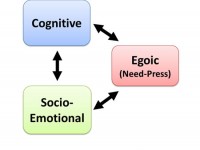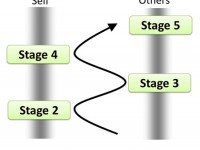The article is based on a dialog between a mentor and a behavioral coach who desires to learn to think developmentally. After an introduction on coaching focused on clients’ Frame of Reference, the four individual dialogs deal with the three aspects of human capability, the nature of developmental scores, the nature of behavioral “need-press” scores, and the synthesis of CDF data for use in coaching practice. Laske 2007 Mentoring a Behavioral Coach to Think Developmentally Read More...
Tag: Socio-emotional Dimension
What is the Constructive Developmental Framework?
Otto Laske gives you an overview of the Constructive Developmental Framework CDF and offers a few examples of how it can be used for self-awareness and personal growth. The emphasis in the video is that when we speak and relate to others, we are already embedded in a "frame of reference", and that this frame develops over the entire life span. That means that, in a way, we are sitting in a cave, without our knowing, unless we decide to explore the cave. Read More...
Introduction to the three CDF Dimensions (Self-Study)
This course introduces students to a widely acclaimed, holistic perspective on both individuals and teams. It is an overview course focused the three perspectives in which CDF-users view clients: the social-emotional, cognitive, and psychological one. Insight into these dimensions stems from decades of validated research since the 1970s but has not been widely taught in a unified fashion. In the course, emphasis is placed as well on the interrelationships between the three dimensions since they closely interact in coaching as well as consulting. Based on this course, students become eligible for all other CDF courses. Read more Read More...
Socio-Emotional Development
The essence of the socio-emotional dimension has to do with how adults differ in making meaning of their life and work experiences based on their opposing and intertwined needs of being autonomous and being included in a community of others. These two lifelong tendencies achieve a different balance at every developmental “stage”. Social-emotional differences between people manifest not only in their “thinking”, but since thinking precedes acting, also in their goal setting, decision making, and, most directly, in the relationships individuals develop with others. In this life-changing course, students learn in depth not only the theory of social-emotional meaning making as developed by the Kohlberg School at Harvard, but acquire the practical skills of using what they learn, whether in making cogent assessments, giving cogent feedback, coaching, or consulting. Read More...
Case Study I (a): Practicum in Social-Emotional Thinking and Listening
This course is focused on a single-client case study. It leads participants from merely talking about levels of meaning making to interactively determining them through semi-structured interview with a chosen client, and to documenting the client’s present meaning making based on 15 structurally relevant interview fragments. The program offers students the opportunity to show themselves and others that they have not only mastered “developmental theory”, but also know how to use it in practice. For the student, writing a case study involves: Completing a 1-hr semi-structured social-emotional interview Transcribing the interview(s) into English for discussion in the study cohort Selecting 15 structurally relevant fragments of the interview conducted Evaluating a Need/Press Questionnaire (guided by the instructor) Based on fragments of the social-emotional interview, presenting in class a coding sheet showing how the interview fragments are to be evaluated, for discussion in the study cohort At the end of the course, gathering and submitting all pertinent materials making up the case study to the Director of Education for personal feedback on scoring and focusing of client feedback. Read more Read More...
Case Study II: CDF Dimensions in their Interrelationship within a Client’s Unitary Consciousness
This program serves the sole purpose of deepening practical know-how of CDF by bringing together all of its three dimensions. Consequently, it presupposes both a social-emotional and cognitive case study as well as the ability to evaluate and give feedback on the outcome of the Need/Press Questionnaire. The program offers students the opportunity to show themselves and others that they have not only mastered “developmental theory”, but also know how to use it in practice. Writing a second case study involves: Completing a 1-hr social-emotional and 1-hr cognitive interview with a client other than the person engaged in Case Study I (a+b) Transcribing both interviews into English for discussion in the study cohort Evaluating the outcome of the psychological Need/Press Questionnaire Selecting from the social-emotional interview 15, from the cognitive interview 30 short fragments that appear to be structurally relevant for determining developmental profile Presenting a coding sheet of these fragments for each transcribed interview, to be evaluated by the cohort together with the instructor Submitting all materials required for written case study to the Director of Education Attending a feedback session with the Director of Education Giving full feedback to the client, both for self-insight and coaching Read... Read More...

